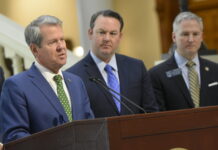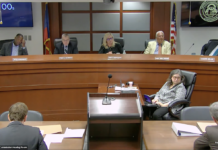
WASHINGTON (GA Recorder) — Ukrainian President Volodymyr Zelenskyy on Thursday traveled to Capitol Hill to meet with lawmakers to reiterate the need for continued aid to support his country’s fight against the Russian invasion, even as the U.S. faces a partial government shutdown as soon as the end of the month.
“If we don’t get the aid, we will lose the war,” Zelenskyy said to senators, according to Senate Majority Leader Chuck Schumer.
There’s bipartisan support in the Senate to approve the White House request for $24 billion in supplemental aid to Ukraine, including from top Senate appropriators. However, some Republican senators are lukewarm, and others are firmly opposed. House Speaker Kevin McCarthy has not openly expressed support as he grapples with gaining enough votes from his party to avoid a shutdown.
“It is very clear that if we were to have a government shutdown or pass a CR without Ukrainian aid, the damage that would occur on Ukraine’s campaign would be devastating,” Schumer, a New York Democrat, said.
CR refers to a continuing resolution, the name for the short-term government funding bill that lawmakers must pass to give themselves more time to pass the full-year spending bills.
U.S. House Republicans are currently struggling to produce and pass a short-term plan to fund the government past the end of the month. If a stopgap spending bill is not passed by the Sept. 30 deadline, then a partial shutdown will commence.
Congress was not Zelenskyy’s only stop while in Washington. He met with President Joe Biden and U.S. Defense Secretary Lloyd J. Austin.
During an open-press portion of his meeting with Zelenskyy, Biden excoriated Russia for aggressing on its neighbor, commended Ukraine’s response and committed further U.S. security and humanitarian aid to Ukraine.
Biden announced the next tranche of military aid, comprising artillery, ammunition, anti-tank weapons, and the first U.S. Abrams tanks to be sent to Ukraine. The U.S. president said he was confident Congress would fund further aid.
“I’m counting on the good judgment of the United States Congress,” he said in response to a reporter’s question following the meeting. “There’s no alternative.”
Zelenskyy thanked Biden, Congress and the American people for their solidarity over the 575 days of the war.
He told Biden the new defense package “has exactly what our soldiers need.”
The Ukrainian president said he would soon announce a new agreement that would boost his country’s defense capabilities.
Following an earlier Thursday meeting with Zelenskyy, House Foreign Affairs Committee Chair Michael McCaul, a Texas Republican, said during a press conference that Congress should specify the specific weapons that Zelenskyy asked for in the $24 billion supplemental funding bill, such as F-16 jets and long-range artillery.
“This man has moral courage and moral clarity,” McCaul said of Zelenskyy. “The will of the Ukrainian people is far stronger than the will of the Russians.”
McCaul said that McCarthy is supportive of sending aid to Ukraine. McCaul said he believes McCarthy can get more Republicans on board.
Zelenskyy described his meetings with members of both parties in Congress as “frank, constructive dialogue,” according to a pool report.
Vance leads letter of opposition
After a Wednesday closed-door Senate briefing about Ukraine, more than two dozen Republican lawmakers sent a letter to the White House opposing any more funding.
Ohio GOP Sen. J.D. Vance posted the letter to X, formerly known as Twitter, that was signed by 28 Republicans.
“Yesterday at a classified briefing over Ukraine, it became clear that America is being asked to fund an indefinite conflict with unlimited resources. Enough is enough. To these and future requests, my colleagues and I say: NO,” according to the letter.
Those GOP senators who signed onto the letter include Vance, Rand Paul of Kentucky, Mike Braun of Indiana, Tommy Tuberville of Alabama, Mike Lee of Utah and Roger Marshall of Kansas. About two dozen members of the U.S. House signed the letter, none from Georgia’s delegation.
House Republicans and a handful of Senate Republicans who did not sign the letter have also been critical about overall government spending and providing additional support for Ukraine.
U.S. Sen. Josh Hawley, a Missouri Republican, said he is opposed to approving aid to Ukraine because he doesn’t see Ukraine defeating Russia anytime soon.
“It sounds to me like this is a stalemate,” he said. “What’s our plan? What are we going to do? Are we just going to spend hundreds of billions indefinitely? What is the plan here? I just don’t know.”
U.S. Sen. Ron Johnson, a Wisconsin Republican, was not moved.
“What you’d expect,” he said. “It’s the same points being made, there’s nothing particularly new.”
However, U.S. Democratic Sen. Tina Smith of Minnesota said that Zelenskyy “struck a very bipartisan note.”
“His main message was one of gratitude for the help that the United States (has) provided to Ukraine and … ask that we continue that support so that Russia doesn’t overrun Ukraine,” Smith said.
$24 billion request
The White House is asking for Congress to approve $24 billion for several types of aid to Ukraine.
The request asks Congress to provide $13.1 billion for the Defense Department, $8.5 billion for the State Department and USAID, $2.3 billion for the Treasury Department, $100 million for the Department of Health and Human Services and $68 million for the Energy Department.
Top Senate appropriators Patty Murray, Democrat of Washington, and Susan Collins, Republican of Maine, both said they believe Ukraine should receive aid.
Collins said she asked Zelenskyy what would be the impact if Ukraine only received military aid rather than economic and humanitarian aid.
“He explained that all of their budget is going to aid their soldiers and sailors and that if they did not get the humanitarian and economic aid, they would lose their school teachers, their health care professionals would leave, and … additional people would literally die,” Collins said.
In a statement, Murray said that Ukraine’s defense against Russia is at a critical point.
“[I]t’s so important that Congress continues our strong and bipartisan support for Ukraine, so they have the resources and weapons they need to defend themselves against Putin’s invasion,” she said.
Congress has approved four aid packages for Ukraine since the war began in February of last year, totaling $110 billion.
The first aid package was approved in March 2022 and included $13.6 billion. The second assistance package was approved in May 2022 and provided $40 billion, and the third relief package was approved in September 2022 for more than $12 billion. A fourth supplemental package was approved in December 2022 for $45 billion.
McConnell: ‘Support for Ukraine is not charity’
Senate Minority Leader Mitch McConnell, Republican of Kentucky, has pressed for additional military and humanitarian aid for Ukraine to help bolster democracy in Eastern Europe.
“At the risk of repeating myself, American support for Ukraine is not charity,” McConnell said in a statement. “It’s an investment in our own direct interests — not least because degrading Russia’s military power helps to deter our primary strategic adversary, China.”
Florida Sen. Marco Rubio, a senior GOP member on the U.S. Senate Committee on Foreign Relations, said that Zelenskyy laid out to senators what would happen if U.S. support were to vanish.
“Russia would make very substantial gains,” he said.
U.S. Democratic Sens. Tim Kaine of Virginia and Ron Wyden of Oregon said Zelenskyy’s meeting showed how this is a pivotal moment.
“He did a very, very good job of explaining what the stakes are for Ukraine, for Europe, and for the democracies of the world if you allow an authoritarian to get away with it,” Kaine said. “He also pointed out that actually giving into Putin is the thing that creates the forever war.”
U.S. Democratic Sen. Cory Booker of New Jersey said Zelenskyy made a “very urgent case for the United States to stay engaged and to continue with support.”
Pentagon spokesman Brigadier Gen. Pat Ryder told reporters Thursday that the Defense Department will continue to seek bipartisan support for Ukraine aid in Congress.
“It’s important, again, to re-emphasize why Ukraine matters,” he said. “In addition to helping our Ukrainian partners to defend themselves from unprovoked aggression, the implications, not only on European security, but also on U.S. and international security are very stark … If Russia were to succeed in eliminating Ukraine as a nation, they won’t stop there.”
Making school bomb shelters more comfortable
Ukrainian First Lady Olena Zelenska was also in Washington, where she visited students, faculty and staff at Georgetown University.
She spoke about the ways education has been affected by the conflict, with young children spending their first day of school learning in bomb shelters.
“I’m looking at you and I can see our students,” Zelenska said. “I don’t think you are that different. And you have one particular trait in common, that’s caring and empathy and wanting to change things for the better.”
She said that her foundation in Ukraine has three priority areas: humanitarian assistance, support for education and support for health care. One of the foundation’s projects is aimed at making bomb shelters for schools in Ukraine more comfortable. So far, eight schools are part of the program.
“If there is no bomb shelter in a school, children cannot attend it, school will just not open, so a lot of children do distance learning,” Zelenska said.
Zelenska was presented with the Hillary Clinton Award for advancing women, peace and security. She was awarded this recognition virtually last year.
Zelenska stressed that if her country were to be defeated, it would not just impact Ukraine and its people, but threaten everyone.
“If you have power, if you have opportunities and resources, you can do anything you want,” Zelenska said. “You can be a tyrant, you can seize other countries, other territories, and then these situations mean that no one is safe in this world.”
“To turn a blind eye means to turn your back to your own future,” she said.
Samantha Dietel, Jennifer Shutt and Jacob Fischler contributed to this report.







